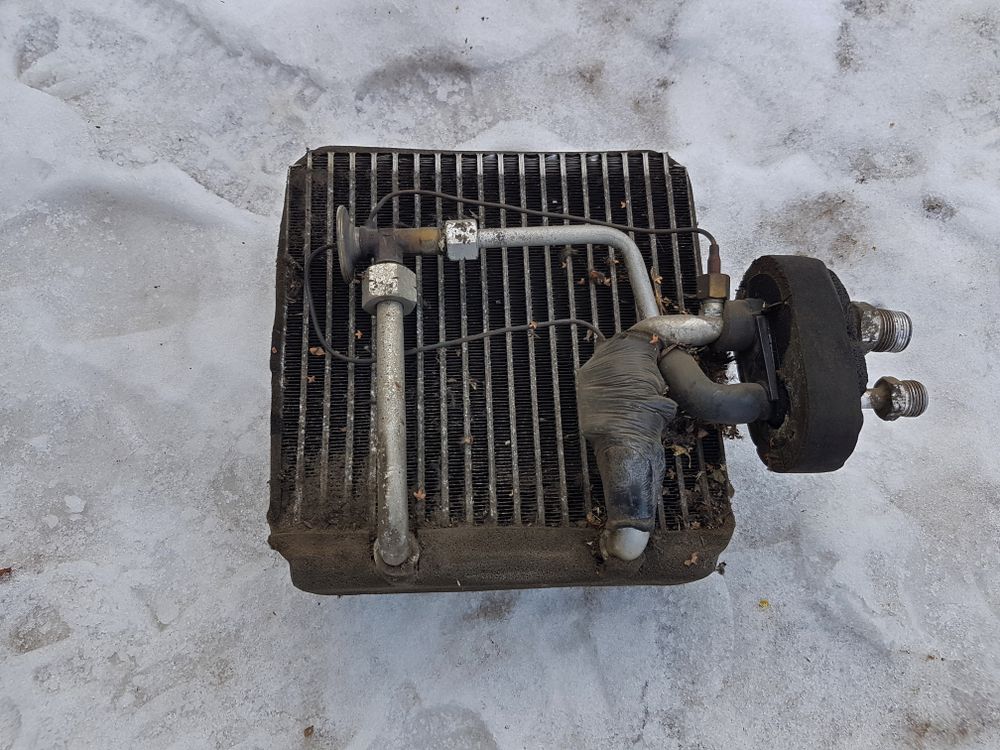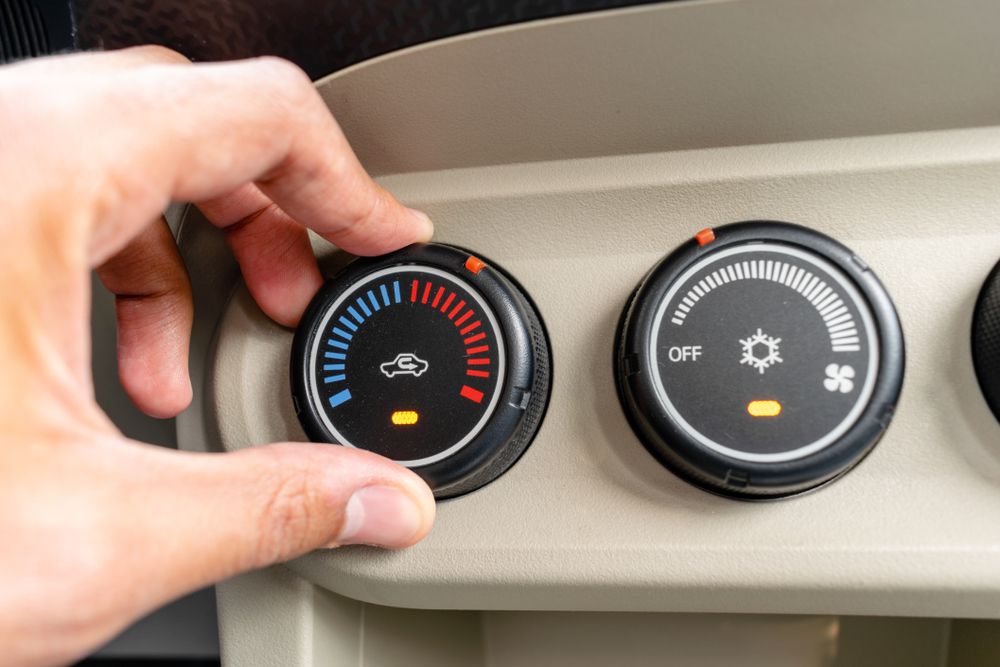During the cold months of winter, it's nice to know you can count on your
car heater to blow hot air. However, sometimes your car heater will start
to blow cold air out of nowhere, leaving you wondering what may be causing
it to happen.
Your car heater can start to blow cold air for several different reasons. A
lack of coolant or a stuck thermostat can be the cause.
A leaking or
clogged heater core can also be to blame. A bad fuse or other electrical
issue may be the problem.
Thankfully, you can get your car heater to blow hot air with a little time
and basic knowledge. Below are some ways to track down the problem.
 A heater blowing cold air into a car.
A heater blowing cold air into a car.
Why Is My Heat Not Blowing Hot In My Car?
Your vehicle's heating system uses the same coolant that keeps the engine
cool to give you hot air inside your cabin.
It does this by passing the hot
coolant through a heater core located underneath your dashboard.
The heater
core then heats the air that blows through your vents.
There are a few
reasons why this process can stop working right.
1. Low Coolant Level
If your car's cooling system doesn't have enough coolant to circulate
properly, then it won't send coolant to your heater core.
Check your
coolant level at the coolant bottle in your engine compartment.
If it's too
low, refill it to the proper level with a 50/50 mix of coolant and water.
Always make sure your engine is cold before you do this, since hot coolant
is under pressure and can spray out and cause severe burns!
 Filling a radiator with coolant.
Filling a radiator with coolant.
2. Heater Core Problems
Your car heater core itself can be the source of the problem. If you have
enough coolant but still no warm air, then this is the next thing to pay
attention to.
It's basically a small radiator, located under the dashboard.
Since it always has coolant flowing through it, it can develop leaks or get
clogged.
3. Malfunctioning Heater Core
If your core is leaking, you'll notice it in one of two ways. If it's a
small leak, you'll have fog on the inside of your windshield. This fog will
have a sweet coolant smell to it.
If it's a large leak, you'll notice wet
carpet on your passenger side floorboard, or even a puddle of coolant if
the leak is large enough.
Since the heater core is almost always located on
the passenger side of your dashboard, that's where the leaking coolant will
accumulate.
If your have a plugged heater core, you'll notice that one of the two
rubber hoses that supply it with coolant will be cold to the touch when
warm coolant is flowing to it.
You can find these two hoses by tracing them
from the water pump or radiator to the firewall, the back wall of the
engine compartment.
 Radiator and heater core.
Radiator and heater core.
How Expensive Is It To Replace A Heater Core?
Usually the part itself is fairly cheap. Most of them average between $100
to $300. The problem is that most cars require the dashboard to be taken
apart to access the core.
This can be an intimidating job for a home
mechanic, so most people will take it to a repair shop to have it replaced.
An average cost for a repair shop to replace it can be anywhere from $500
to over $1000 depending on the model of the car and where the repair is
done.
4. Heating Controls Not Working
The other possible culprit is the heating controls themselves. It's
possible that your electronics have malfunctioned, and are not working like
they should.
Is There A Fuse For The Heater In My Car?
The heater core itself isn't controlled by any electronics, so it doesn't
have a fuse. The blower motor, which is the part inside of your air vents
that causes air to circulate, does have a fuse that controls it.
Can A Blown Fuse Cause No Heat In My Car?
If the fuse that controls your blower motor goes bad, it'll cause the
blower motor to stop working.
This will cause your heat to stop working,
because no air will circulate through your vents.
If you notice that you
have no air coming through your vents at all, either hot or cold, this is a
sure sign that you could have a blown fuse.
 Malfunctioning heater controls can impact the temperature inside your car.
Malfunctioning heater controls can impact the temperature inside your car.
How Do I Know If My Heater Fuse Is Blown?
You can easily check the fuse for your blower motor to see if it is blown.
Locate your fuse panel.
Most vehicles have the fuse panel located on the
driver's side underneath the dashboard.
Look for a small cover, either near
the steering column or the side panel close to your brake pedal.
This cover
should have a diagram showing you which fuse is for the blower motor.
If
not, check your owner's manual.
Once you locate the fuse for your blower motor, gently pull it out with a
pair of needle nose pliers.
Check to make sure that the small metal bridge
is connected to both pins.
A bad fuse will have a break in this bridge, and
may look burned on the inside of the plastic cover.
If your fuse is blown,
it needs to be replaced as soon as possible.
Make sure you replace it with
a fuse that has the same amp rating, which is the small white number on the
top of the fuse.
What Do I Do If My Heat Is Blowing Cold Air?
The first thing you need to do if you notice that your car heater is
blowing cold air is find the cause of the problem. Once you have figured
this out, you can decide if it's something that you can fix yourself or if
you need to take it to a mechanic.
How To Fix Car Heater Blowing Cold Air?
Simple fixes like topping off your coolant or replacing a fuse can quickly
be done at home. If you have a leaking or clogged heater core, that's a
more complicated repair that you may want to have done by a mechanic.
However, if you're decently skilled at repair work, you can definitely take
it on yourself.
 A mechanic repairing a cooling system.
A mechanic repairing a cooling system.
How Do You Test A Heater Core?
You can test by watching your windshield for fogging, or checking your
floorboard for dampness or puddles of coolant.
These are signs that you
have a leak somewhere in the heater core.
You can also check for a clog by
feeling the hoses in your engine compartment that circulate coolant through
it.
How Do You Check For A Clogged Heater Core?
Once you locate the two hoses that connect to your heater core, you just
have to feel them both once the engine warms to normal temperature.
If the
coolant can't circulate through the heater core properly, then one of the
two hoses will be cool to the touch.
How Do You Unclog A Heater Core?
To do this, you have to use either water or compressed air to flush out the
blockage.
First, you have to disconnect both of the hoses running to your
core at the firewall.
Once you do, coolant will leak out of the heater
core, so make sure you have a bucket and other clean-up materials ready.
Once it is drained, you have to attach a length of rubber tubes to each end
of the core.
Secure the tubes with duct tape so it doesn't leak.
One end
needs to run into your bucket.
Carefully run either water or compressed air
through the tubes until it flows freely.
Once it is clear, remove the tubes
and reattach the hoses from your cooling system.
Car Blowing Cold Air Cost To Fix?
A blown fuse will cost a few dollars to replace.
It's less than $20 to
refill your coolant.
Other electrical issues may be slightly more
expensive, but usually no more than $100.
If you have to replace your
heater core, it can be between $500 and $1000 if you have a repair shop do
it, but can be much cheaper if you do it yourself.
Conclusion
It's a common problem for vehicles to have issues with the heating system,
but it doesn't have to keep you cold in the winter.
Use this guide, and you
will know what to look for and how to keep it working correctly.